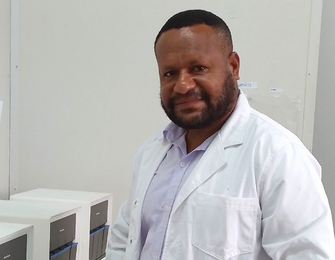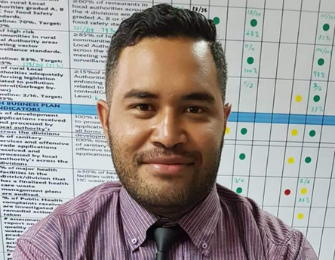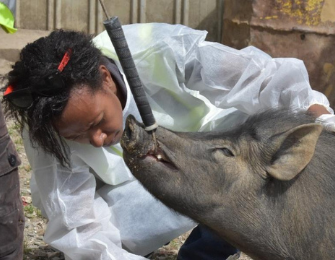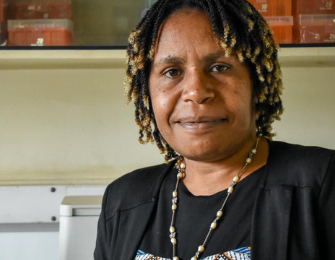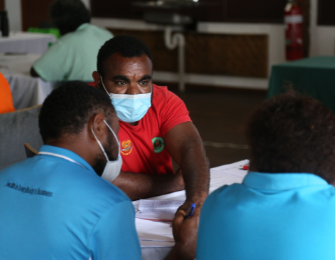
World Field Epidemiology Day 2021
Philip Popai is a field epidemiologist working with the Manus Provincial Health Authority (PHA). Prior to COVID-19, he worked in the emergency department of the provincial hospital. The CEO of the PHA, recognizing his field epidemiology training, requested his transfer to head up the Province’s COVID-19 rapid response team. Since that time, he has been leading case investigation and contact tracing activities in Manus.
Philip says that his field epidemiology training program (FETP) experience has given him the confidence to step up and take this leadership role. His gentle personality has been a huge asset when going into communities to do contact tracing. With many rumours circulating around the virus, community members are fearful of public health workers, often thinking they are bringing in the virus. Philip patiently addresses these fears through lengthy consultations with community members and families, carefully listening and answering their questions and concerns.
He describes that on one occasion a group of men armed with machetes and sticks came to attack him when he entered a village. “Community engagement can never be forgotten or neglected”, Philip explains. He was able to calmly talk to the men and defuse the tense situation. “It takes time, I go and listen to their concerns and address them”. As the country scales up their vaccine rollout, the importance of careful and meaningful engagement is more important than ever; not only to maximize vaccine uptake, but to protect health care workers on the frontlines. Philip points to his FETP training as a turning point in his career, teaching him the skills required to make evidence-based decisions to guide his response activities.
The FETP graduates are involved in a very active WhatsApp group where they share information and strategies for addressing the many challenges they face when combatting COVID-19 on the frontlines.
Philip has recognised the critical importance of case isolation and has been advocating for the establishment of an isolation facility in Manus. This facility is nearing completion.
Philip is also working with David Lapun, fellow FETP graduate and Director of Public Health in Manus, to implement an operational research study exploring why many mild and moderately ill cases are not complying with isolation requirements. Philip is one of 96 FETP graduates across PNG - almost all of whom have been involved in the COVID-19 response, many in leadership positions.
The FETP in Papua New Guinea currently has two levels of training – an Intermediate program and an Advanced (extended) program. Next year, the team will commence a Frontline program, focused on workers at the health centre level. These health workers will be trained by the graduates of the Intermediate and Advanced programs and will focus on surveillance, outbreak response and community engagement. PNG’s FETP program is housed within the National Department of Health and supported by partners, including the Field Epidemiology in Action team funded by the Indo-Pacific Centre for Health Security.
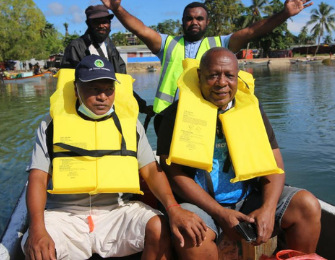 Philip Popai
Philip Popai
What is your current role?
I work as a Clinician at the Accident & Emergency Department. I also work as the Cluster Lead of the COVID-19 Rapid Response Team working as Epidemiologist and Clinician.
What drew you to work in Health Security?
I admire the fact that when we respond to public health issues, we intervene and make decisions or recommendations to protect the health and welfare of a large number of population. Unlike in curative health, where we treat and manage a lesser number of people at a time.
How does your work impact people’s lives?
People are starting to shake off the idea of stigma and discrimination from COVID-19. Increasingly people are coming in freely for swabbing and testing when they have influenza-like illness symptoms.
What are some of the challenges you face in your work?
Ready access to misinformation on social media; people know too much false information about COVID-19; stigma and discrimination of people with COVID-10 or health care staff involved in COVID-19 response, leading to poor cooperation with the community members; poor self-isolation compliance; and threats from the general public toward health care workers.
What is the most rewarding thing about your work?
I am becoming better at providing basic health education and awareness to individuals and households in the communities. As I continued to visit more people, I developed a structured way of calming down anger, stigma and uncertainties in people and I am able to convince them to allow my team to carry out its activities.
During FETPNG training, what was the health issue you chose to address?
During my training, the issue I chose address was diabetes. I put in place an intervention that includes conducting blood sugar checking of any patient that enters the hospital with diabetes-related symptoms. I also started a continuous health education and awareness program on diabetes and its complications to all general patients waiting in the queue at the triage area.
Learn more about the Centre's support to Field Epidemiology training in PNG and the Solomon Islands.

